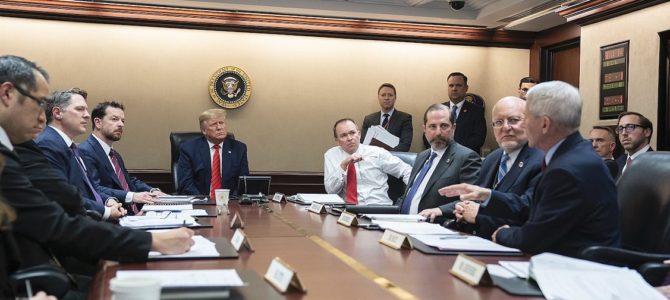Well, that didn’t take long. What began as a deadly global epidemic has, in the hands of the American political and media elite, mutated into a political talking point. Good job, everyone.
Don’t get me wrong, the coronavirus is deadly and spreading fast. The first case with no known link to foreign travel was confirmed in the United States Wednesday, bringing the total number of infections here to 60; France reported its first coronavirus death, Spain had eight new cases in a 24-hour span, new infections were reported in Germany, Greece, France, Croatia, Austria, and Switzerland, and a new case in Brazil marks the spread of the disease to Latin America.
So of course the response here in the United States has been partisan attacks. The Trump administration’s request this week for $2.5 billion to fight the virus was met with derision by congressional Democrats who thought the figure much too low and took the opportunity to decry the president’s “towering incompetence,” as Senate Minority Leader Chuck Schumer put it.
Not to be outdone, during the umpteenth Democratic presidential debate Tuesday night the candidates took time out from shrieking at one another and waving their hands around to bash Trump for his handling of the crisis. Sen. Bernie Sanders mocked the president’s previous tweets promising the outbreak would be over by April, which prompted Trump to get on Twitter and fire back, saying his administration is doing a “GREAT” job and complaining that Democrats wouldn’t give him any credit even if the virus disappeared tomorrow.
But he wasn’t done. Trump took to Twitter again Wednesday morning to accuse CNN and “MSDNC” of doing “everything possible” to make the outbreak “look as bad as possible, including panicking markets, if possible.” For good measure he added, “Likewise their incompetent Do Nothing Democrat comrades are all talk, no action. USA in great shape!”
Let’s hope everyone can leave it at that for a little while and get on with preparing for a global pandemic. Late Wednesday at a White House news conference, Trump said he’d be open to however much funding Congress wants, and apparently Senate Majority Leader Mitch McConnell and House Speaker Nancy Pelosi are hard at work on an emergency funding package.
Given the profound divisions in American public life and the growing antipathy between right and left, it’s little wonder that even something as dire and deadly as a coronavirus pandemic—a threat that should bring us together—instead brings out the worst in our leaders.
This thing is moving fast, so expect the media to switch into hysteria and blame mode any second now. As Ross Douthat of The New York Times noted earlier this week, up until now there’s been a strange lack of urgency about the virus from those quarters where you’d most expect to see hysteria and hyperbole: cable news and social media.
He suggests the reason for this is “an interplay between polarization and ideological preconceptions.” Conservatives don’t want fears of a pandemic to tank the economy going into a presidential election, liberals don’t want to acknowledge that the rapid spread of the virus is a massive indictment of the kind of borderless, globalized world they’ve long supported.
Both sides seemed hesitant to acknowledge the seriousness of the outbreak—not because they didn’t think it serious, but because they were worried about other things, namely, holding onto or seizing power in November.
All that’s probably over now. As the crisis deepens, the political establishments have decided it would be best if their opponents took the blame for how serious this thing has gotten, or might get. The press and social media are already following suit.
At this point, we should expect the media to start stoking hysteria, the politicians to pile on the recriminations, and for everything—the disease itself and its aftereffects on public life—to get much worse.









